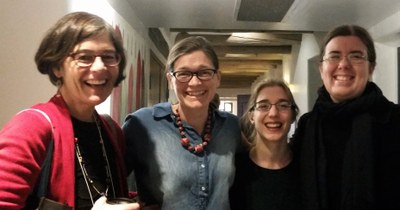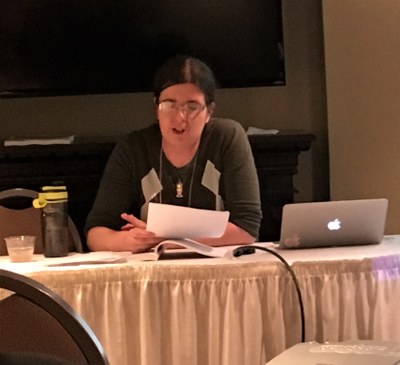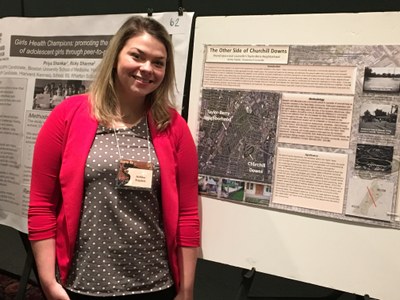Meetings of the Society for Applied Anthropology
This year, five members of our Department participated in the Meetings of the Society for Applied Anthropology, in Santé Fe, New Mexico. As well as enjoying green chili and blue corn delicacies, they had a fine time talking research, learning about new projects, and sharing their own work.

Laura Valentine presented a paper based on research about local farmers’ markets, Farmers’ Market Promotion Program: A View from a Church Parking Lot in Kentucky. See Here’s what she had to say about the experience.
"I was petrified flying into New Mexico to attend the SfAA conference. I was petrified for most of the week, likely compounded by the unfamiliar high altitude and newness of the high desert as a whole, not to mention the looming task at the end of the week, when I presented my speech as part of a panel. I had never presented before, and, despite putting in hours on the research, feeling confident in my ability to present generally, and knowing that the only way I could really mess up the speech would be to oversleep and miss my 8AM panel entirely (or perhaps throwing up during, or breaking into tears), I still felt small arriving at the conference. It can be intimidating and imposter's syndrome can set in. I didn't feel particularly like an academic, I was still uneasy and clumsy at introducing myself to others at the conference, and I felt awed by the research I saw, impressed even as I was re-evaluating my own thesis to be as glamorous as the ones I saw presented (of course, it's unfair to compare ourselves to PhD students several years into their research). But as the week progressed, I realized that the point of being in a Masters program is to be afraid—well, not afraid, but to do what scares you and to try new things. To take risks. That I felt so nervous and small was exactly why I needed the experience of attending a conference, a kind of trial by fire to develop skills I didn't have. Through the week, the pattern emerging stuck with me: it doesn't matter if you're scared, talk to that professor anyway. It doesn't matter if you're scared, ask your question to the room anyway. It doesn't matter if you're scared, ask for the email address, ask your question, ask for input. It doesn't matter if you're scared, get feedback and critique, make mistakes. The fear itself is only the result of newness and inexperience and over time will fade—ultimately, the conference was galvanizing. The ideas were useful and interesting, other people willing to talk and develop ideas intelligently; rather than a hostile environment, I found myself in rich surroundings where I was able to feel confident in my field, my research, and their functional potential in the real world. I left SfAA feeling energetic and excited to get back to thesis research. In preparation, at the conference, and when I returned, I felt supported by my department faculty. I was at SfAA presenting research I conducted as part of a team lead by Dr. Markowitz, whose experience and vision for the presentation I was lucky to learn from. Supportive faculty and colleagues back in Louisville allowed me to move forward with this important part of my academic career. The opportunity to present at an annual conference has been one of the most important experiences for me, personally and academically. Conferences offer the opportunity to see what other academics are talking about and where you fit. What occurred at SfAA resembled a large scale effort at problem-solving current issues the field is primed to tackle. So, attending the conference also highlighted another important thing that I had lost sight of: the work we do as academics and social researchers can take many forms, but is impactful, future-minded, and only occurs when we cooperate and give credence to one another's ideas."
Irene Levy Yates gave a talk from her soon to be completed MA thesis.

"SfAA was a great opportunity for me to connect with other anthropologists who are interested in applying anthropological knowledge to address critical global issues. Researchers working on migration and refugee resettlement were well represented in Santa Fe and I was able to learn things from their work that I can apply to my research. Presenting my work in front of such knowledgeable practitioners was terrifying, but it was gratifying to hear that other areas of the United States are grappling with some of the same challenges as we face here in Louisville. I hope that I will be able to collaborate with some of the individuals that I met in my future career."
Ashley Triplett presented here research in the form of a poster.

"Attending SFAA was an extraordinary opportunity for me to connect and engage with other anthropologists who are also exploring questions of urbanization. Santa Fe presented a unique opportunity to meet other researchers from across the country that provided meaningful feedback and reflections on my work. In addition, through observing the work of other researchers, I was able to gain insight on other perspectives of urban anthropology that has strengthened my research. SFAA was my first conference experience and poster presentation. I was grateful for the wisdom and guidance from Dr. Storey throughout this learning opportunity. I was bitten by the conference bug, the intoxicating atmosphere of academia, and a space to be able to grow as an anthropologist. I will definitely be back for more!"
Dr. Angela Storey coordinated a Round Table discussion entitled” Alongside, With, or For?: Examining the Many Modes of Community Engagement.” Anthropologists often work formally and informally with NGOs, community groups, institutions, or businesses to conduct research. Work alongside or in cooperation with groups is not always done “for” them, however. Effectively engaging stakeholder groups in ethnographic research is a complex question grounded in methods, ethics, the value of results to collaborators, and even engagement guidelines from Institutional Review Boards. This roundtable explores how participants engaged with community groups during fieldwork with social movements in South Africa, factory workers in Kentucky, refugees in Kenya, and animal shelters in Wisconsin. We will include audience discussion about best practices, challenges, and lessons learned.
She also participated in a second Round Table called” Anthropologies of Pedagogy/Pedagogies of Anthropology.”
Dr. Lisa Markowitz organized a panel, “Good Intentions and Mis(sed)alignments in Expanding Food Access: Stories of Policy, Planning, and Markets.” With emphasis on corporate malfeasance and individual decisions, popular accounts of food system failures too often elide the role of the state. Government entities—from county to federal levels—via the multiple levers of enforcement, omission, legislation, funding, and zoning and so forth have influenced and shaped food access across scales and locales. Drawing from ethnographic research across the United States, we examine the interplay of state actors, community stakeholders, farmers, and eaters in policy, program, and market arenas.
